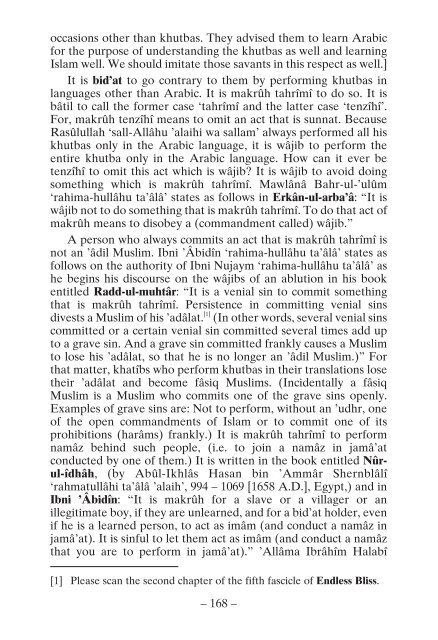Miftah-ul-Janna (Booklet for way to Paradise)
Create successful ePaper yourself
Turn your PDF publications into a flip-book with our unique Google optimized e-Paper software.
occasions other than khutbas. They advised them <strong>to</strong> learn Arabic<br />
<strong>for</strong> the purpose of understanding the khutbas as well and learning<br />
Islam well. We sho<strong>ul</strong>d imitate those savants in this respect as well.]<br />
It is bid’at <strong>to</strong> go contrary <strong>to</strong> them by per<strong>for</strong>ming khutbas in<br />
languages other than Arabic. It is makrûh tahrîmî <strong>to</strong> do so. It is<br />
bâtil <strong>to</strong> call the <strong>for</strong>mer case ‘tahrîmî and the latter case ‘tenzîhî’.<br />
For, makrûh tenzîhî means <strong>to</strong> omit an act that is sunnat. Because<br />
Rasûl<strong>ul</strong>lah ‘sall-Allâhu ’alaihi wa sallam’ al<strong>way</strong>s per<strong>for</strong>med all his<br />
khutbas only in the Arabic language, it is wâjib <strong>to</strong> per<strong>for</strong>m the<br />
entire khutba only in the Arabic language. How can it ever be<br />
tenzîhî <strong>to</strong> omit this act which is wâjib? It is wâjib <strong>to</strong> avoid doing<br />
something which is makrûh tahrîmî. Mawlânâ Bahr-<strong>ul</strong>-’<strong>ul</strong>ûm<br />
‘rahima-h<strong>ul</strong>lâhu ta’âlâ’ states as follows in Erkân-<strong>ul</strong>-arba’â: “It is<br />
wâjib not <strong>to</strong> do something that is makrûh tahrîmî. To do that act of<br />
makrûh means <strong>to</strong> disobey a (commandment called) wâjib.”<br />
A person who al<strong>way</strong>s commits an act that is makrûh tahrîmî is<br />
not an ’âdil Muslim. Ibni ’Âbidîn ‘rahima-h<strong>ul</strong>lâhu ta’âlâ’ states as<br />
follows on the authority of Ibni Nujaym ‘rahima-h<strong>ul</strong>lâhu ta’âlâ’ as<br />
he begins his discourse on the wâjibs of an ablution in his book<br />
entitled Radd-<strong>ul</strong>-muhtâr: “It is a venial sin <strong>to</strong> commit something<br />
that is makrûh tahrîmî. Persistence in committing venial sins<br />
divests a Muslim of his ’adâlat. [1] (In other words, several venial sins<br />
committed or a certain venial sin committed several times add up<br />
<strong>to</strong> a grave sin. And a grave sin committed frankly causes a Muslim<br />
<strong>to</strong> lose his ’adâlat, so that he is no longer an ’âdil Muslim.)” For<br />
that matter, khatîbs who per<strong>for</strong>m khutbas in their translations lose<br />
their ’adâlat and become fâsiq Muslims. (Incidentally a fâsiq<br />
Muslim is a Muslim who commits one of the grave sins openly.<br />
Examples of grave sins are: Not <strong>to</strong> per<strong>for</strong>m, without an ’udhr, one<br />
of the open commandments of Islam or <strong>to</strong> commit one of its<br />
prohibitions (harâms) frankly.) It is makrûh tahrîmî <strong>to</strong> per<strong>for</strong>m<br />
namâz behind such people, (i.e. <strong>to</strong> join a namâz in jamâ’at<br />
conducted by one of them.) It is written in the book entitled Nûr<strong>ul</strong>-îdhâh,<br />
(by Abûl-Ikhlâs Hasan bin ’Ammâr Shernblâlî<br />
‘rahmat<strong>ul</strong>lâhi ta’âlâ ’alaih’, 994 – 1069 [1658 A.D.], Egypt,) and in<br />
Ibni ’Âbidîn: “It is makrûh <strong>for</strong> a slave or a villager or an<br />
illegitimate boy, if they are unlearned, and <strong>for</strong> a bid’at holder, even<br />
if he is a learned person, <strong>to</strong> act as imâm (and conduct a namâz in<br />
jamâ’at). It is sinf<strong>ul</strong> <strong>to</strong> let them act as imâm (and conduct a namâz<br />
that you are <strong>to</strong> per<strong>for</strong>m in jamâ’at).” ’Allâma Ibrâhîm Halabî<br />
[1] Please scan the second chapter of the fifth fascicle of Endless Bliss.<br />
– 168 –

















